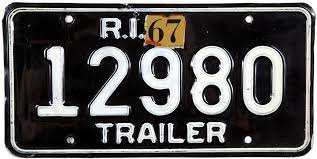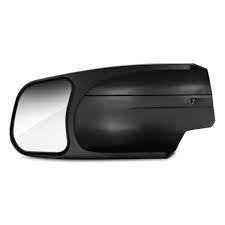Rhode Island Trailer Laws and Regulations
If you often find yourself towing heavy loads around your state you probably have some idea of the state laws and rules that apply to do this. Some people may not be aware however that sometimes laws can differ state by state. This can mean you might be legal in one state but crossing the border you might well get pulled over for an infringement you were not expecting.
In this article we are going to look at the laws for Rhode Island which may vary from the state you might be driving in from. There may also be regulations you were not aware of as a native to the state which might catch you out. So read on and let us try to keep you from costly tickets.
Do Trailers Need to be Registered In Rhode Island?
In the state of Rhode Island if your trailer was made in 2001 or later and has a Gross Vehicles Weight Rating of 3,001 lbs. or more it will require a title and will also need to be registered.

Rhode Island General Towing Laws
These are general rules in Rhode Island regarding towing that you might come foul of if you were not aware of them. Sometimes you may get away with an infringement of these rules because you did not know them but you can not assume this will be the case.
There are no rules in this category but in the absence of this we must assume that general rules of the road should be adhered to. If it is something that would be illegal without a trailer the high likelihood is that you should not do it with a trailer.
Rhode Island Trailer Dimension Rules
It is important to know the state laws governing the sizes of loads and trailers. You may need permits for some loads while others may not be allowed on certain types of roads.
- The total length of the tow vehicle and trailer is 60 ft.
- The maximum length of the trailer is not specified.
- The maximum width for a trailer is 102 inches.
- The maximum height of a trailer and load is 13 ft 6 inches.
Rhode Island Trailer Hitch and Signal Laws
There are laws in Rhode Island that relate to the trailer hitch and safety signals displayed by the trailer. It is important to be aware of these laws as they are safety based so may carry potentially large fines.
When towing another motor vehicle the drawbar or other connection must be strong enough to pull the weight and the connection must be no more than 15 ft.
Rhode Island Trailer Lighting Laws
When you are towing something that will obscure the rear lights of your tow vehicle it is important to be able to communicate your upcoming and present actions in the form of lights. This is why there are rules regarding trailer lighting.
The tail vehicle in a towing situation must have at least 1 tail lamp emitting a red light which is visible from at least 500 feet away.
Rhode Island Speed Limits
When it comes to speed limits this varies and depends on the posted speeds of the specific area. You obviously should not exceed the posted speed limit in any area. When it comes to normal towing there are no specific different limits but it is expected that the speed is kept at a sensible level.
If your trailer is being caused to sway or lose control due to speed you may be pulled over even if you are within the posted limits. This is because the trailer may be posing a threat to public safety and you will be asked to slow down.
In Rhode Island a tow truck or any vehicle towing another, except when designed to be in tow together, cannot travel faster than the traffic in the right-lane of a 2-lane highway. On a 3-or more lane highway, they are restricted to only the two right lanes.
Rhode Island Trailer Mirror Laws
The rules for mirrors in Rhode Island are not specified although they are likely required and you may be pulled over if you do not have any or they are unusable. If your view is compromised by the width of your load you may want to consider extensions to your existing mirrors. These can be in the form of mirror extenders that slot onto already existing wing mirrors.

According to Rhode Island law the driver of the tow vehicle must be able to see the road behind them for at least 200 ft while driving. If the view is blocked by the trailer or load then mirrors must be configured in such a way as to compensate.
Rhode Island Brake Laws
The brakes on your tow vehicle and potentially on your trailer are important to the safety of any towing operation. Ensure that they meet state guidelines and adhere to the stated rules for use on the road with a trailer.
- Trailers that weigh more than 4,000 lbs. need to be fitted with brakes that can slow them , stop them and keep them in place. These should be operational from the tow vehicles cab and there should be a backup system that engages should the trailer break free from the tow vehicle.
- The parking brake on the tow vehicle and trailer must be strong enough to hold the setup stationary on any incline and any weather conditions.

Conclusion
There are a number of laws in Rhode Island that pertain to towing and trailers which are designed to keep the roads and road users safe. The laws in Rhode Island are not extensive but most of them are common sense.
The ability to see and be seen on the roadways while towing are of utmost importance as are the ability to brake and tow a heavy load in a stable manner.
Link To or Reference This Page
We spend a lot of time collecting, cleaning, merging, and formatting the data that is shown on the site to be as useful to you as possible.
If you found the data or information on this page useful in your research, please use the tool below to properly cite or reference Tow Ratings as the source. We appreciate your support!
-
<a href="http://towratings.net/blog/rhode-island-trailer-laws-and-regulations/">Rhode Island Trailer Laws and Regulations</a>
-
"Rhode Island Trailer Laws and Regulations". Tow Ratings. Accessed on April 19, 2024. http://towratings.net/blog/rhode-island-trailer-laws-and-regulations/.
-
"Rhode Island Trailer Laws and Regulations". Tow Ratings, http://towratings.net/blog/rhode-island-trailer-laws-and-regulations/. Accessed 19 April, 2024
-
Rhode Island Trailer Laws and Regulations. Tow Ratings. Retrieved from http://towratings.net/blog/rhode-island-trailer-laws-and-regulations/.